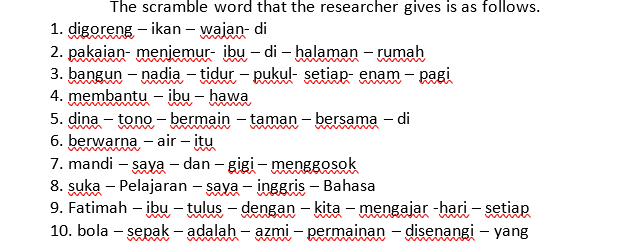The The Use of Scramble Technique in Teaching Literacy For Fourth Grade Student At Sanggar Bimbingan Hulu Kelang Malaysia
DOI:
https://doi.org/10.30736/ej.v11i2.1147Keywords:
scramble technique, teaching literacyAbstract
This can be seen from the lack of knowledge in making simple sentences owned by students and difficulties in composing sentences properly. In addition, students' lack of attention to the teacher's explanation, lack of writing practice and feel less confident and worried that they will be laughed at by the surrounding environment if they make mistakes. So this research want to know the implementation of scramble technique in teaching literacy and students and teacher perception on the use of scramble teachnique in teaching literacy. This study uses case study. . The object of research is fourth grade students at Sanggar Bimbingan Hulu Kelang Malaysia as many as 6 students. From this study suggest that scramble technique is an effective pedagogical tool to improve writing skills of fourth grade. By combining structured guidance with engaging and interactive activities, this method successfully improves the ability to write simple sentences and self-confidence of fourth grade students of Sanggar Bimbingan Hulu Kelang Malaysia.
Downloads
References
Acim, A., Fadli, M. R., & Sopacua, J. (2023). The Influence of Scramble Method to Increase Students’ Interest in Learning History. Journal of Innovation in Educational and Cultural Research, 4(1), 19–25. https://doi.org/10.46843/jiecr.v4i1.406
Dita, A., & Zaki, L. B. (2022). The Effects of Scramble Game in Improving Students Vocabulary at Secondary Students of Muhammadiyah Plus Batam. International Social Sciences and Humanities. https://doi.org/https://doi.org/10.32528/issh.v2i1.156
Dobson, P. J. (1999). Approaches to Theory Use In Interpretive Case Studies - a Critical Realist Perspective. https://api.semanticscholar.org/CorpusID:16931765
Febriyanti, N. (2021). Implementasi Konsep Pendidikan menurut Ki Hajar Dewantara. Jurnal Pendidikan Tambusa, 5. https://doi.org/10.32332/riayah.v5i01.2306
Ghasemi, H. R., & Rasekh, N. (2020). Identifying Dimensions of Communication Literacy: Thematic Analysis Approach. https://doi.org/https://doi.org/10.22038/JHL.2019.43878.1085
Gravitiani, A. N., Istiyati, S., & Kamsiyati, S. (2022). Penerapan model pembelajaran scramble untuk meningkatkan motivasi belajar ips peserta didik di sekolah dasar. Didaktika Dwija Indria, 10(3), 30–35. https://doi.org/10.20961/ddi.v10i3.64176
Ilela, N., Laamena, C. M., & Tamalene, H. (2021). MODEL PEMBELAJARAN CORE, SCRAMBLE, HASIL BELAJAR, DAN OPERASI HITUNG BENTUK ALJABAR. Journal of Honai Math, 4, 85–100. https://doi.org/https://doi.org/10.30862/jhm.v4i1.175
Imam Tabroni, Rendy Afrizal, Elsa Nurmawati, Siti Nurlatifah, & Siti Nurlatifah. (2021). Character Building: an Answer To the Worsening of Human Character? SOKO GURU: Jurnal Ilmu Pendidikan, 1(3), 11–14. https://doi.org/10.55606/sokoguru.v1i3.57
Imami, F., Wasitohadi, W., & Sri Rahayu, T. (2018). Peningkatan Minat Belajar Tematik Mupel Ipa Melalui Pembelajaran Kooperatif Tipe Scramble Siswa Kelas 5 Sdn Salatiga 09 Tahun Pelajaran 2017/2018. Pendekar : Jurnal Pendidikan Berkarakter, 1(1), 246. https://doi.org/10.31764/pendekar.v1i1.366
Ina Daril Hanna, I. D. H., Rini Listyowati, R. L., & Jaftiyatur Rohaniyah, J. R. (2024). Enhancing Eleventh-Grade Students’ Vocabulary Mastery Through Crossword Puzzle: a Pedagogical Innovation At Ma Miftahul Qulub, Polagan Galis Pamekasan. E-Link Journal, 11(1), 17–29. https://doi.org/10.30736/ej.v11i1.1034
Kharisna, F., Gusmaweti, & Sari, S. G. (2020). The Effect of Using Scramble Learning Models on Students Learning Motivation in Science Study Theme 6 Class IV SDN 04 Kampung Olo Madya Padang City. https://api.semanticscholar.org/CorpusID:230650092
Marisyah, A., Firman, & Rusdinal. (2019). PEMIKIRAN KI HADJAR DEWANTARA TENTANG PENDIDIKAN. Jurnal Pendidikan Tambusai, 3, 1514–1519.
Murti, O. S., & Reinita, R. (2020). Pengaruh Model Kooperatif Tipe Think Pair Share terhadap Hasil Belajar Tematik Terpadu di Sekolah Dasar. Jurnal Pendidikan Tambusai, 4(3), 2147–2155. https://doi.org/10.31004/jptam.v4i3.691
Nofrianni, E., Andriani, O., & Prahagia, Y. (2024). Workshop Efektivitas Membaca Pemahaman Menggunakan Model Kooperatif Tipe Scramble Di Sekolah Dasar. 6(1), 1335–1340.
Numanovich, A. I., & Abbosxonovich, M. A. (2020). THE ANALYSIS OF LANDS IN SECURITY ZONES OF HIGH-VOLTAGE POWER LINES (POWER LINE) ON THE EXAMPLE OF THE FERGANA REGION PhD of Fergana polytechnic institute, Uzbekistan PhD applicant of Fergana polytechnic institute, Uzbekistan. EPRA International Journal of Multidisciplinary Research (IJMR)-Peer Reviewed Journal, 2, 198–210. https://doi.org/10.36713/epra2013
Pekkolay, S. (2022). The Importance of Literacy. Scholars Journal of Arts, Humanities and Social Sciences, 10(1), 6–8. https://doi.org/10.36347/sjahss.2022.v10i01.002
Peristiwanti, A. N. (2021). RESILIENSI KADER POSYANDU DALAM MEMBERIKAN PELAYANAN KEPADA ANAK DI POSYANDU TERATAI RW 08 KELURAHAN REMPOA PADA MASA PANDEMI COVID-19. UIN SYARIF HIDAYATULLAH JAKARTA, 6.
Putri, A. R., Ardianti, S. D., & Ermawati, D. (2022). Model Scramble Untuk Meningkatkan Kemampuan Membaca Pemahaman Siswa. Jurnal Educatio FKIP UNMA, 8(3), 1192–1199. https://doi.org/10.31949/educatio.v8i3.3162
Ratna, Y., Sari, I., & Sundaygara, C. (2024). Penggunaan Model Scramble Berbantuan Media Hapkekal untuk Meningkatkan Literasi Membaca dan Prestasi Belajar Siswa. 1(2), 2724–2733.
Sa’adah, L., & Daning Hentasmaka. (2024). Online Language Assessment on Secondary Schools: an Investigation on Students’ Perception and Preference. E-Link Journal, 11(1), 96–110. https://doi.org/10.30736/ej.v11i1.1078
Shaw, D. M., & Mahlios, M. C. (2008). Pre-Service Teachers’ Metaphors of Teaching and Literacy. Reading Psychology, 29, 31–60. https://doi.org/https://doi.org/10.1080/02702710701568397
Shoimin, A. (2021). 68 model pembelajaran inovatif dalam kurikulum 2013. Ar Ruzz Media.
Soegiyono. (2011). Metode Penelitian Kuantitatif, Kualitatif dan R&D.
Solihin, R. K., & Muaz, M. (2022). Improving English Learning Outcomes Using the Scramble Learning Method for Class VII Students of MTs Daarul Uluum PUI Ranji. JADEs Journal of Academia in English Education. https://doi.org/https://doi.org/10.32505/jades.v3i2.4789
sri suwartini. (2017). Pendidikan Karakter dan Pembangunan Sumber Daya Manusia Keberlanjutan. https://api.semanticscholar.org/CorpusID:150835375
Tamela, E., Tara Mustikaning Palupi, & Hanip Pujiati. (2024). How English Teachers’ Lesson Plans Incorporate Learning and Innovation Skills. E-Link Journal, 11(1), 1–16. https://doi.org/10.30736/ej.v11i1.1016
Wahyudi, R., Irvan, I., & Nasution, M. D. (2023). Meningkatkan Hasil Belajar Matematika Pada Materi Transformasi Geometri Menggunakan Model Pembelajaran Kooperatif Tipe Scramble. AXIOM : Jurnal Pendidikan Dan Matematika, 12(1), 46. https://doi.org/10.30821/axiom.v12i1.11130
Widayati, A. (2004). METODE MENGAJAR SEBAGAI STRATEGI DALAM MENCAPAI TUJUAN BELAJAR MENGAJAR. Journal Pendidikan Indonesia, 3, 64–70.
Yin, R. K. (2018). Case Study Research and Applications Sixth Edition.

Downloads
Published
How to Cite
Issue
Section
License
Copyright (c) 2024 Fadhilah, zulfa

This work is licensed under a Creative Commons Attribution 4.0 International License.








